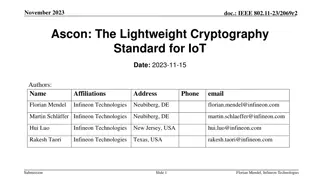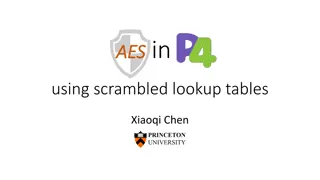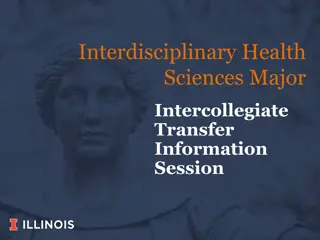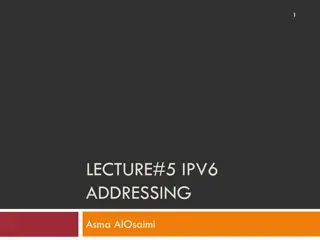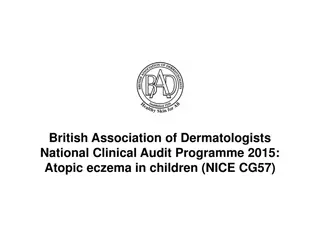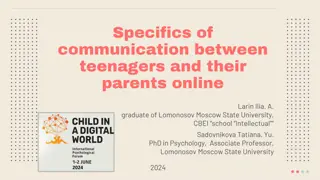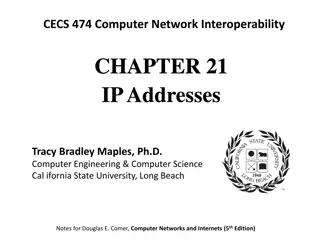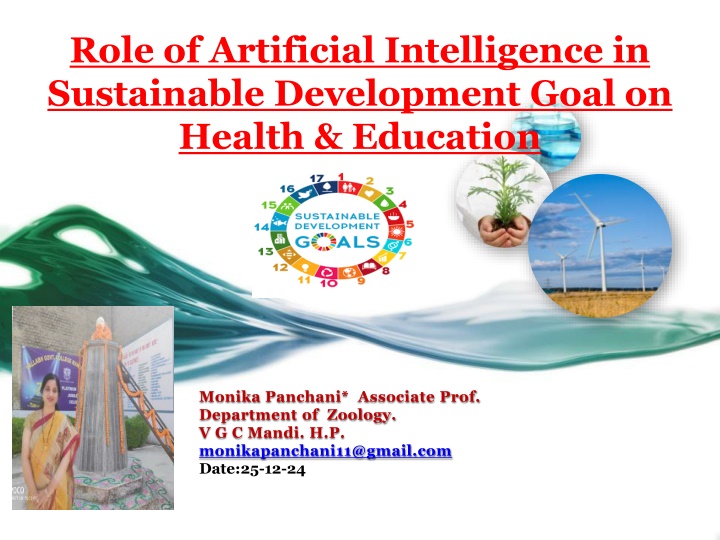
Leveraging Artificial Intelligence for Sustainable Development in Health & Education
Discover how Artificial Intelligence plays a crucial role in advancing Sustainable Development Goals focused on health and education, offering innovative solutions to improve access, quality, and outcomes in these fields. Explore the benefits, challenges, and potential of AI in achieving SDGs 3 and 4.
Download Presentation

Please find below an Image/Link to download the presentation.
The content on the website is provided AS IS for your information and personal use only. It may not be sold, licensed, or shared on other websites without obtaining consent from the author. If you encounter any issues during the download, it is possible that the publisher has removed the file from their server.
You are allowed to download the files provided on this website for personal or commercial use, subject to the condition that they are used lawfully. All files are the property of their respective owners.
The content on the website is provided AS IS for your information and personal use only. It may not be sold, licensed, or shared on other websites without obtaining consent from the author.
E N D
Presentation Transcript
Role of Artificial Intelligence in Sustainable Development Goal on Health & Education Monika Panchani* Associate Prof. Department of Zoology. V G C Mandi. H.P. monikapanchani11@gmail.com Date:25-12-24
ABSTRACT Role of Artificial Intelligence in Sustainable Development Goal on Health & Education Dr. Monika Panchani* Associate Prof. Department of Zoology. V G C Mandi. H.P. monikapanchani11@gmail.com The United Nations' Sustainable Development Goals (SDGs) emphasize the importance of and good health and well-being (SDG 3) and quality education (SDG 4) for achieving sustainable development. Artificial Intelligence (AI) has emerged as a key enabler of these SDGs, offering innovative solutions to improve access, quality, and outcomes in education and healthcare. In education, AI can enhance personalized learning, automate grading, and provide real-time feedback, leading to improved student outcomes and increased access to quality education. AI-powered adaptive learning systems can also help address learning disparities and promote inclusive education. In healthcare, AI can improve disease diagnosis, predict patient outcomes, and optimize treatment plans, leading to better health outcomes and improved quality of life. AI-powered chatbots and virtual assistants can also enhance patient engagement, improve health literacy, and support preventive care. However, the integration of AI in education and healthcare also poses challenges, including ensuring equity, addressing bias, and protecting sensitive data. To harness the potential of AI in achieving SDGs 3 and 4, it is essential to develop and deploy AI solutions that prioritize human well-being, equity, and sustainability. Keywords: Sustainable Development Goals, Artificial Intelligence, Education, Healthcare, Personalized Learning, Disease Diagnosis, Patient Outcomes, Equity, Bias, Data Protection.
The United Nations' Sustainable Development Goals (SDGs) emphasize the importance of good health and well-being (SDG 3) and quality education (SDG 4) for achieving sustainable development goals. Artificial Intelligence (AI) has emerged as a key enabler of these SDGs, offering innovative solutions to improve access, quality, and outcomes in education and healthcare. In education, AI can enhance personalized learning, automate grading, and provide real-time feedback, leading to improved student outcomes and increased access to quality education. In healthcare, AI can improve disease diagnosis, predict patient outcomes, and optimize treatment plans, leading to better health outcomes and improved quality of life.
To harness the potential of AI in achieving SDGs 3 and SDGs 4. To develop and deploy AI solutions that prioritize human well-being, equity, and sustainability. For this study secondary information has been collected through several research papers and analyzed thoroughly. Keywords like sustainable development, Artificial intelligence, education and health issues and challenges of these were used for getting research articles.
SDG 12: Responsible Consumption and Production SDG 1: No Poverty .SDG 7: Affordable and Clean Energy SDG 13: Climate Action SDG 2: Zero Hunger SDG 8: Decent Work and Economic Growth SDG 3: Good Health and Well-being SDG 14: Life Below Water SDG 9: Industry, Innovation, and Infrastructure SDG 4: Quality Education SDG 15: Life on Land SDG 10: Reduced Inequalities SDG 16: Peace, Justice, and Strong SDG 5: Gender Equality SDG 11: Sustainable Cities and Communities SDG 6: Clean Water and Sanitation SDG 17: Partnerships for the Goals
In education, AI can enhance personalized learning, automate grading, and provide real-time feedback, leading to improved student outcomes and increased access to quality education. AI-powered adaptive learning systems can also help address learning disparities and promote inclusive education. AI-driven personalized learning systems meets the individual student needs, improves learning outcomes and increases accessibility to maximum (Ekirapa, 2023).
By 2030, substantially increase the number of youth and adults who have relevant skills, including technical and vocational skills, for employment, decent jobs and entrepreneurship Eliminate gender disparities in education and ensure equal access to all levels of education and vocational training for the vulnerable, including persons with disabilities, indigenous peoples. By 2030, ensure that all youth and a substantial proportion of adults, both men and women, achieve literacy and numeracy Ensure that all learners acquire the knowledge and skills needed to promote sustainable development. Adopt sustainable lifestyles, work for human rights, gender equality, promotion of a culture of peace and non-violence, global citizenship and appreciation of cultural diversity and of culture s contribution to sustainable development
In healthcare, AI can improve disease diagnosis, predict patient outcomes, and optimize treatment plans, leading to better health outcomes and improved quality of life. AI- powered chatbots and virtual assistants can also enhance patient engagement, improve health literacy, and support preventive care. AI algorithms can assist in the early detection of diseases such as malaria and tuberculosis, leading to timely interventions and better health outcomes (Mubangizi, 2023).
Machine learning algorithms can analyze vast datasets, identifying patterns that may escape human observation, leading to more accurate diagnoses and timely interventions. AI-powered predictive analytics contributes to improved public health by forecasting disease outbreaks. Machine learning algorithms are vital for decoding diverse medical data, revealing patterns, predicting conditions, and aiding decisions. NLP facilitates language comprehension, supporting voice recognition, chatbots, and extracting medical insights. Computer vision enhances image interpretation. AI collaborates with robots in healthcare tasks demanding precision. AI excels in diagnostics, identifying diseases accurately, and advancing personalized medicine via genomic analysis. It optimizes healthcare, predicts drug interactions, and predicts outbreaks.
Artificial Intllignc (AI) assists In mting all th 12 targ ts of SDG-3 Targ t 3.1: R duc mat rnal mortality Target 3.2: End pr v ntabl deaths of n wborns and children Target 3.8: Achi v univ rsal health cov rag (UHC): Target 3.9: R duc th impact of environmental pollution: Target 3.3: Combat communicabl diseases Target 3.a: Incr as r s arch and development (R&D) for h alth: Target 3.4: R duc non- communicabl diseases (NCDs) Target 3.5: Str ngth npr v ntion and treatment of substance abus Target 3.b: Support h althcar workforce in d v loping countri s Target 3.6: R duc road traffic accidents: Target 3.c: Improv acc ss to essential m dicin s and vaccin s: Target 3.7: Ensur univ rsal access to s xual and reproductive h althcar s rvic s:
AI in education and healthcare also poses challenges, including ensuring equity, addressing bias, and protecting sensitive data. According to national education targets, the percentage of students attaining basic reading skills by the end of primary school is projected to rise from 51 per cent in 2015 to 67 per cent by 2030. However, an estimated 300 million children and young people will still lack basic numeracy and literacy skills by 2030. However, disparities in access to digital tools and internet connectivity pose significant barriers to the widespread adoption of AI in education (Deep Learning Indaba, 2023). Despite these advancements, the successful deployment of AI in healthcare faces hurdles including data quality and privacy concerns, inadequate infrastructure, and ethical issues surrounding AI-driven decisionmaking (Kiguli, 2023).
Challenges in health sector There is need to ensure AI is well regulated to make sure it is fair, accessible and ethical. There is need for equal access to AI tools, applications, and infrastructure, including good data and computing resources. Justice also requires capacity building and technological change. AI's presence in healthcare raises ethical and societal worries(Murphy, K., Di Ruggiero, E., Upshur, R., et al.,2021).
The use of collaborative approach with responsible development and culturally respectful solutions should be considered while supporting locally produced data (Walugembe and Onyango, 2024). Data sharing digital infrastructure should be paired with training programs for government employees wider workforce. AI must be fair and transparent, current biased and discriminatory AI adoption models cannot protect the Sustainable Development Goals. Use of ethical tools and various artificial intelligences to solve the challenges facing the sustainable development goals. AI governance but must ensure that common standards, collaborative governance and human rights .
AI-focused workshops and training programs are being implemented to build local capacity and ensure equitable access to AI technologies. Government, private sector, and international partners need to come together to enhance infrastructure, invest in education and training, and develop robust governance frameworks to ensure the ethical and equitable use of AI (United Nations, 2023; Deep Learning Indaba, 2023). Low levels of information and communications technology (ICT) skills are also a major barrier .
Artificial intelligence has several benefits in various sectors in different countries both in developed and developing, however, this technology still carries significant risks. They can switch jobs, exploit inequalities in international governance, and fuel injustice, discrimination, and misinformation. The aim is to use this powerful tool to achieve sustainable development and at the same time minimize its damage (Marjan et al, 2023). This means that creators and users of AI systems are held accountable. The power, speed, and impact of AI are real in the world, and accountability should be part of it. The benefits and opportunities of AI must not remain in the hands of few and there should not be any digital divide (Walugembe and Onyango, 2024).
Developing education and training focused on artificial intelligence and other technologies. These programs should focus on regulatory bodies and employers to provide them with the skills needed to participate in and benefit from AI-focused industries. Create opportunities for career development and advancement in technical skills. This will include working with universities, business schools and industry leaders to develop curricula and certifications that meet the needs of business. Building local expertise in AI is crucial. This can be achieved by integrating AI and data science into the education curriculum at all levels, from primary to tertiary education. Additionally, offering specialized training programs and workshops can equip professionals with the necessary skills to develop and manage AI technologies (Ekirapa, 2023; Deep Learning Indaba, 2023).
CONCLUSION The Sustainable Development Goal aims to provide free, equitable and quality education to boys and girls by 2030, ensuring that they acquire the knowledge and skills they need for sustainable development, and eliminating all gender discrimination in education. There is need for continued global commitment to ensuring inclusive and equitable education for all. Measures such as making education free and compulsory, increasing the number of teachers, improving basic school infrastructure and embracing digital transformation are essential.
Deep Learning Indaba. (2023). IndabaX: Uganda. Retrieved from https://deeplearningindaba.com Ekirapa, M. (2023). The role of AI in improving educational outcomes in Uganda. Educational Technology Research, 21(2), 95-110. Kiguli, J. (2023). Ethical considerations in the deployment of AI in healthcare: A case study of Uganda. Bioethics Journal, 18(3), 221-235. Marjan, Riyam K. and Hasan Zubaidi, Ali Mohammed (2023) "Artificial Intelligence and Sustainable Development," Al-Mustaqbal Journal ofSustainability in Engineering Sciences: Vol.1 : Iss. 1 , Murphy, K., Di Ruggiero, E., Upshur, R., et al. (2021). Artificial intelligence for good health: a scoping review of the ethics literature. BMC Med Ethics, 22(14), 14. United Nations. (2023). Harnessing artificial intelligence for sustainable development in developing countries. UNSDG Report. Retrieved from https://unsdg.un.org Walugembe B. & Onyango, L. O. O., (2024). An AI-Driven Approach to Mitigate the Digital Divide in Educational Resource, International Journal of Modernisation in Engineering Technology and Science; Vol 06 Issue 06, pg 2001-2006.
Dependencies and Resources Vendors Remote Teams Manufacturing Project Sales Engineering


